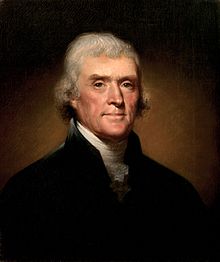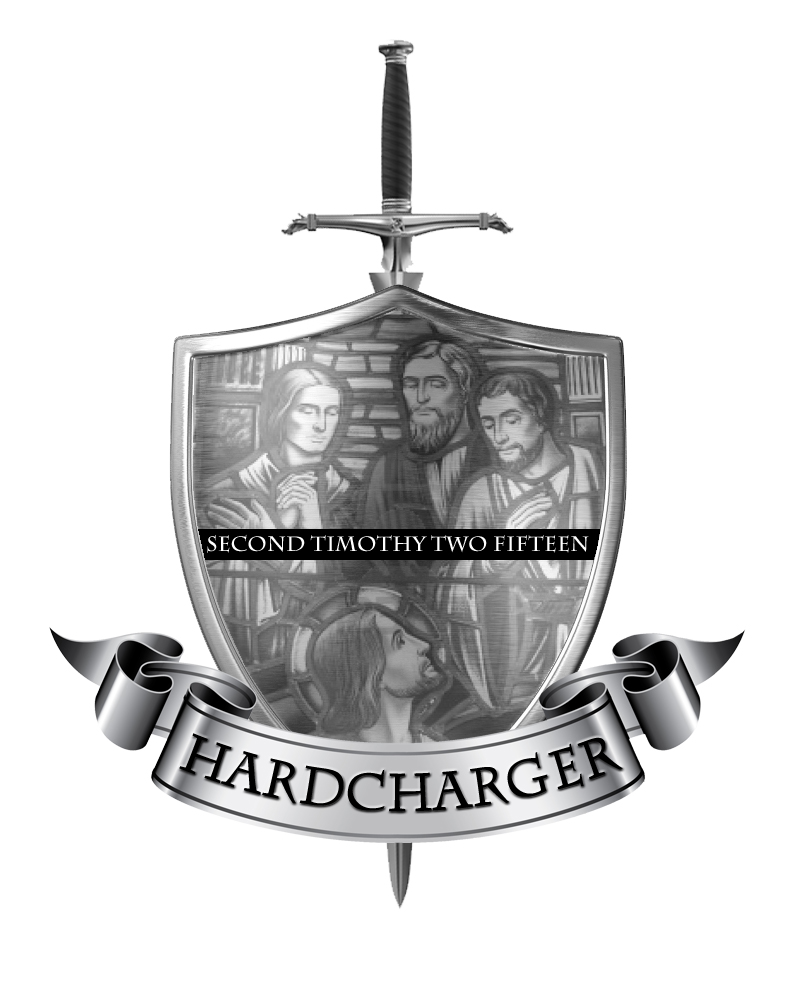Thomas Jefferson at Ten Years Old

- It wasn’t that long ago if you were old enough to work, you were an adult. That means by the time we were getting our Learner’s Permit, George Washington had already completed surveying the territory we now know as Virginia and Thomas Jefferson was several years removed from proving himself capable of surviving in the woods, thanks to a challenge presented by his father when Thomas was ten.
- History echoes Scripture as far as how young people are far more capable than our culture gives them credit for
- As adults we do well to process these realities as our cue to be more diligent in encouraging the young people in our charge as well as “sucking it up” when confronted with challenges that pale in comparison to those that our younger historical counterparts had to face.
Thomas Jefferson. He’s ten years old and his father sends him into the woods alone. The assignment is to demonstrate his ability to survive in the wild. All he’s got is a gun and his wits.1
10 year old Thomas is able to prove himself and he would go on to accomplish some extraordinary things as a statesman and as the third President of, what at the time was a very young and unsteady nation.
I’m wondering what would happen if such a thing were attempted today. What if a father handed his ten year old son a shotgun and told him that he had the afternoon to find and kill his supper. Given today’s culture, I’m thinking that would be considered abusive and Family Services would be called upon to help the Dad better understand how to properly raise a boy.
And who’s to say that Family Services wouldn’t have a point? We don’t expect that kind of capacity in a youngster, but my question is: Should we? Should we expect a ten year old to be capable with a shotgun? And why stop there? Should we expect more out of kids than we do?
Back in the day, if you were old enough to work, you were considered an adult. Jewish culture defined a boy as a man at the age of thirteen. They were getting married and starting their family right about the time our kids are entering their freshman year in High School.
And it wasn’t that long ago when teenagers were already documenting some extraordinary things on their resume. George Washington was 17 when he was commissioned to survey the area we now know as the state of Virginia.2 David Farragut, who would go on to become the Admiral of the United States Navy, was commissioned as a midshipman on December 17th, 1810 at the age of nine. Farragut was 12 when, during the War of 1812, he was given the assignment to bring a ship captured by the USS Essex safely to port.3
Now we look at these things and our mouths drop open – incredulous that such demands were being put on individuals at an age where, by today’s standards, they’re playing video games or maybe working at a fast food restaurant. They’re certainly not commanding naval vessels or defining the boundaries that constitute state lines.
But however you want to process that, and there are several things I suppose that could be gleaned from these facts, there are two main ideas that I take away from these historical realities:
- Young people are capable of far more than our culture gives them credit for
- I need to quit my whining
The Capacity of a Young Person
While our culture balks at the idea of a high school freshman or an older middle school-er being capable of, not just assuming adult level responsibilities, but actually excelling in the way he or she performs, it was considered commonplace and even expected not that long ago.
But rather than continue citing historical examples, let’s just go to Scripture and glean from God’s Word some bottom lines that transcend cultural norms – whatever they might’ve been during various times throughout human history.
Let’s start with David:
He looked David over and saw that he was little more than a boy, glowing with health and handsome, and he despised him. (1 Sam 17:42)
David is young enough to be immediately recognized by Goliath as a “boy.” He’s old enough to be married, according to 1 Samuel 18:42, so he’s at least 13.
We can actually dig a little deeper, though. You had to be at least 20 years old to serve in the Israelite army according to Numbers 1:3 and chapter 26, verse 2. 1 Samuel 17:12 says that Jesse had eight sons and three of them were twenty years or older in that they were serving in the army according to verse 14.
So, it’s easy then to hypothesize that if Jesse’s fourth son wasn’t serving in the army because he wasn’t old enough, he was 19 or younger. You’re going to have roughly one year or more between each son, so if there’s five sons not old enough to serve in the army, that would make David around 15. So, he’s a High School Junior – maybe.
What makes this truly amazing is that David didn’t just defeat Goliath. Prior to his graduating High School, he’s leading Saul’s army according to 1 Samuel 18:5. He is in command of the entire Israelite army and directing them in their tactics.
So there’s one Biblical example of how a young person excelled. And there are several others. Joseph was only seventeen when he was sold into slavery and started working for Potiphar. Because the Lord was with him, Potiphar, recognizing his quality, put him in charge of his entire household. No doubt, there were people older than Joseph who answered to him, which was probably good practice for Joseph in that he would be leading men and even the entire nation of Egypt by the time he was thirty.
The Jewish historian Josephus documents Samuel as being 12 years old when God calls him in 1 Samuel 3:1.4 In that same verse, it’s mentioned how God very rarely spoke to someone. And if He did, you would expect Him to speak to the more advanced and more mature religious authorities. But He didn’t this time. Rather, He spoke to a boy and by so doing identified him as one who would soon be acknowledged by all of Israel as a prophet. This distinction being initiated right around the time present day males are finishing up the seventh grade..
As far as young ladies are concerned, the most obvious example is Mary.
The line separating adolescence and adulthood is represented in Jewish culture by the Bar Mitzvah for boys and the Bat Mitzvah for girls. “Bar” is Aramaic for “son” and “Bat” is translated as “daughter.” The word “Mitzvah” is the Hebrew word for “command.” Bar Mitzvah happened at either 12 or 13 for boys. At that point, they took their place in the religious community and were expected to assume the responsibilities of an adult.5 For young ladies, they would be considered an adult at the age of 12.
There’s no specific reference to a Bar Mitzvah in Scripture, although you can see that dynamic represented in Luke 2:41 where it talks about how Jesus’ parents took Him to the Temple, according to the custom, when He was twelve years old. The NIV Text Note on that passage reads “At age 12 boys began preparing to take their place in the religious community the following year.”6
It should be noted that you wouldn’t see a Bat Mitzvah in Scripture simply because women were not allowed to participate in public worship services. The first Bat Mitzvah wasn’t preformed in the United States until 1922 which was considered a departure from Orthodox Judaism, but a healthy practice nevertheless, although the actual ceremonies will differ depending on the synagogue.7
Regardless of the ceremony, the age of a girl when she was considered to be an adult was around 12. Although our modern day culture doesn’t consider a woman to be of marrying age until she’s in her late teens if not early twenties, ancient Jewish culture had girls traditionally positioned to be married and moms in their early teens.8 Mary would’ve been no exception. That means the virgin who was “highly favored” by the Lord was probably around 13.9 That means before Mary was old enough to get her learner’s permit, she had been visited by an angel, endured the dubious looks typically received by un-wed mothers, compelled to give birth to her first born in a stable, and be hunted by a jealous king.10 And then of course, there’s the prospect of raising the Redeemer of all mankind.
So, it is conclusive, then, to recognize young people as more than just having potential, they have the capacity to do great things. We see this not only in history, but more importantly, in the pages of Scripture.
My Response as an Adult
So how do I need to process that as an adult? How do I need to accommodate that reality as a parent in the way I raise my kids?
As a parent and as a teacher and a coach, it makes me want to be that much more intentional about breathing life into these young people by encouraging them to recognize how God has equipped them to be extraordinary now, and not to feel like their lives aren’t slated to begin until after college.
On a personal level, it inspires me. It reminds me that whatever task I’ve been given, if I’m processing things according to the Sovereignty of God, I’m going to accept these challenges and I’m not going to question whether or not I’m capable or if I’ve made a poor choice just because the going gets a little rough.
And it’s more than, “Well, if a ten year old can successfully hunt down and hill his meal for that evening, I can do…”
No.
Jesus said in John 16:33:
I have told you these things, so that in me you may have peace. In this world you will have trouble. But take heart! I have overcome the world. (John 16:33)
Psalm 139:16 says:
All the days ordained for me were written in your book before one of them came to be. (Ps 139:16)
God’s got a plan. He has a collection of tasks that was in place before you drew your first breath (see Eph 2:10). In light of the detail referenced in Psalm 139:16, it’s pointless to try and distinguish between the profound and the commonplace as far as what God is aware of and what He has ordained in terms of what you’re capable of accomplishing (see 2 Cor 9:8). It’s all there and while His Purposes will prevail regardless (see Prov 19:21), we have an option in terms of utilizing the Strength He makes available, or we can try to do it on our own and risk the possibility of some sinful detours.
I like what Paul says in Colossians when he says:
We proclaim him, admonishing and teaching everyone with all wisdom, so that we may present everyone perfect, in Christ. To this end I labor, struggling with all his energy, which so powerfully works in me. (Col 1:28-29)
The extent and the substance of Paul’s missionary journeys are nothing short of impressive. God used those trips to initiate the spread of the gospel through all of Europe and beyond. Should one attempt to decipher where Paul found the energy needed to accomplish the work in the face of the, in some cases, violent opposition he faced, Colossians 1:28-29 provides the answer. It was God working in and through him. And we can access the same Power when interacting with the challenges we face, but it’s a choice.
Philippians 2:13 says:
For it is God who works in you to will and to act according to his good purpose. (Phil 2:13)
It’s God Who works through us, yes, but we are not mindless marionettes manipulated by a Holy Ghost puppeteer. In verse twelve, Paul says:
Therefore, my dear friends ,as you have always obeyed – not only in my presence, but now much more in my absence – continue to work out your salvation with fear and trembling…(Phil 2:12)
In other words, get on it! Be diligent in seeking out God’s Power and Direction. In the words of Rocky Balboa, “That’s how winning is done!”11
And when you’re inclined to doubt yourself and give up, remember it’s not about you, as far as whether or not you can or you can’t. God can and will accomplish His Purpose through you.
Your qualifications are subordinate to your Identity in Christ. It’s not what you are, it’s who you are. Your current station in life is not the determining factor as far as what you’re capable of when it is God animating His actions through you. And if He can work through a 12 year old Naval officer or a seventeen year old colonial, or provide an edible target for a 10 year old Thomas Jefferson – folks, if God can craft a universe and make the laws of nature bend to His will – He can help you rise to the occasion and be equal to whatever task lies before you.
Let’s go make a difference!
Question: How you take this content and translate into something a young person can sink their teeth into and determine to make better use of their time, as opposed to watching a lot of TV or spending too much time in front the computer? How do you inspire them without becoming over bearing?
You hear the podcast for “Thomas Jefferson at Ten Years Old” by clicking here. You can also download the hardcopy essay by clicking here.
- “Jefferson learned the importance of endurance and improvisation early, and helearned it the way his father wanted him to: through action, not theory. At age ten, Thomas was sent inot the woods alone, with a gun. The assignment – the expectation – was that he was to come home with evidence that he could survive on his own in the wild.” (“Thomas Jefferson: The Art of Power”, John Meacham, page 4, Random House, New York, 2012)
- George Washington, http://en.wikipedia.org/wiki/George_Washington, accessed May 25, 2013
- David Farragut, http://en.wikipedia.org/wiki/David_Farragut, accessed May 25, 2013
- NIV Text Note on 1 Samuel 3:1, “NIV Study Bible”, Zondervan Publishing House, Grand Rapids, MI, 1985, p379
- “Congregation Netzar Torah Yeshua”, “Bar/Bat Mitzvah – Son / Daughter of the Commandment”, http://messianicfellowship.50webs.com/barmitzvah.html, accessed July 22, 2013
- “NIV Study Bible”, Zondervan Publishing House, Grand Rapids, MI, 1985, p1540
- “About.com”, “What is a Bat Mitzvah”, Ariela Pelaia, http://judaism.about.com/od/lifeevents/a/What-Is-A-Bat-Mitzvah.htm, accessed July 22, 2013
- “Quartz Hill School of Theology”, “Ancient Israelite Marriage Customs”, Jim West, ThD, http://www.theology.edu/marriage.htm, accessed July 22, 2013
- Luke 1:28
- Matt 1:19; 2:13; Luke 1:28; 2:7
- “Let me tell you something you already know. The world ain’t all sunshine and rainbows. It’s a very mean and nasty place, and I don’t care how tough you are, it will beat you to your knees and keep you there permanently if you let it. You, me, or nobody is gonna hit as hard as life. But it ain’t about how hard you hit. It’s about how hard you can get hit and keep moving forward; how much you can take and keep moving forward. That’s how winning is done! Now, if you know what you’re worth, then go out and get what you’re worth. But you gotta be willing to take the hits, and not pointing fingers saying you ain’t where you wanna be because of him, or her, or anybody. Cowards do that and that ain’t you. You’re better than that! I’m always gonna love you, no matter what. No matter what happens. You’re my son and you’re my blood. You’re the best thing in my life. But until you start believing in yourself, you ain’t gonna have a life.” (Rocky Film (Balboa), http://en.wikiquote.org/wiki/Rocky_Balboa_(film), accessed May 25, 2013)










Leave a Reply
Want to join the discussion?Feel free to contribute!